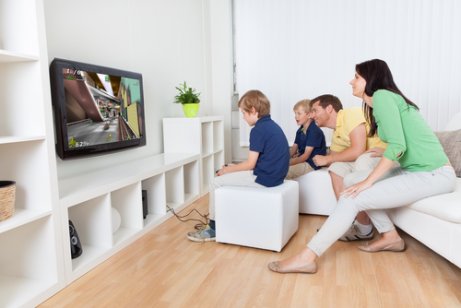The Harmful Effects of Raising Overstimulated Children

Parents are more and more concerned about maximizing their children’s skills and abilities. However, there is a dangerous tendency towards producing overstimulated children. Today we’ll take a look at the risks of this harmful model and how to avoid it.
Children today often have a busy schedule that includes all sorts of activities. On the one hand there are responsibilities like going to school, doing homework, completing household chores and participating in extracurricular activities. And then there are distractions like phones, tablets, computers and video games.
Overstimulated children are those who never stop “doing things.” Their parents treat them as if they were fragile and in need of constant activity to keep from becoming bored. At the same time, the goal of this constant stream of activity is to optimize every opportunity for their development.
As a result, children grow up—even from birth—in an environment of non-stop stimulation. Their parents want their children to be autonomous, independent and capable of making their own decisions. But, is this the right way to achieve that?
This child-raising method is anything but recommended. The negative effects far outweigh the positive, if there are any at all. Overstimulated children are the result of over-demanding parents who don’t give their children any room for freedom.
Overstimulated children: negative consequences
Below is a list of just some of the negative effects of raising children in an environment of constant stimulation:
- Intolerance to being alone.
- Inability to wait or delay gratification.
- Children are unable to overcome boredom and lack creativity.
- Mental exhaustion, which results in reduced mental capacities.
- Narcissistic attitudes, resulting from the misuse/abuse of new technology.
Overstimulated children also cease to enjoy spending time outdoors. This is because things in nature occur at too “natural” a rhythm. In other words, nature moves more slowly.
In the same way, they’re reluctant when it comes to reading books and even short stories. These children are accustomed to the constant, fast-paced stimulation of television, videos, etc.

Is early stimulation useful?
Originally, stimulation during the first months of life was meant for babies with specific difficulties. For example, autism, Down syndrome, cerebral palsy, etc.
However, adults began using these same methods for children who don’t present these issues. The goal, they say, is to maximize children’s abilities through certain cognitive and motor exercises. However, investigations have yet to prove that these exercises are beneficial for typical children.
In fact, subjecting children to these unnecessary tasks can cause them to develop an aversion to similar activities that are beneficial. Early stimulation can also be the root of attention and concentration deficits. This is because the exercises are very mentally demanding and expose children to unjustified stress.
“Parents treat their children as if they were fragile and in need of constant activity to keep from becoming bored. At the same time, the goal of this constant stream of activity is to optimize every opportunity for their development”
How can I avoid raising overstimulated children
1. Allow your children to spend time outdoors
Children need to spend time outdoors. No matter how many activities you provide your children indoors, they cannot develop their senses in the same way. Give your little ones the opportunity to explore, see new things and use their imagination.
2. Keep children away from screens and be careful with content
Playing with technological devices isn’t bad in and of itself. The problem with these gadgets is that they don’t allow children to develop their imagination. The content is all created already.
It’s better for kids to spend most of their recreation time playing with normal, everyday toys and games. While they may seem ordinary and boring to you, they challenge your children to find new uses for them. They’re fun, and much more healthy for child development.
It’s also important for parents to be vigilant of what their children see on TV and on the internet. Cartoons today are full of colors and animations that overload the brain. Rather than allowing your children to relax, they actually produce more mental stress.
3. Encourage conversation
It’s important that we as parents make a point to engage our children in conversation throughout the day. Without us even realizing it, children are losing this habit. So turn off the TV while you eat, for example, and create an environment of family interaction.
Parents are a reflection of their parents’ behaviors. Therefore, logically, you need to show them the way. By simply reading them a story every night, you’ll be strengthening your bond and inspiring your little ones’ imagination.

4. Don’t overload your children with activities
The strong desire to have their children stand out causes many parents to overstimulate them. How? By signing them up for language classes, soccer, piano, yoga, karate and anything else that comes to mind.
As a result, these children hardly have any free time. They don’t know how to entertain themselves when they’re bored because they’ve literally never had the opportunity to learn.
It’s best to keep extracurricular activities to a limit and allow children to develop their skills as naturally as possible.
This text is provided for informational purposes only and does not replace consultation with a professional. If in doubt, consult your specialist.








